

Voyage de santé. M.
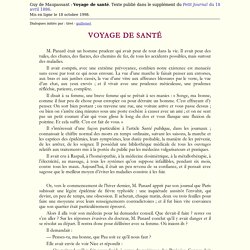
Panard était un homme prudent qui avait peur de tout dans la vie. Aux bons soins de « l'hôpital d'après », une fiction post-crise sanitaire. La semaine imaginaire du coronavirus. Temps de lecture: 4 min Lundi 16 mars En me réveillant ce matin, je repensais à ma mère qui me disait souvent quand j'étais petit, que je n'arriverai à rien dans la vie, et qu'en travaillant si mal à l'école, ce serait un miracle si je parvenais à faire tout de même un métier un peu ingrat, genre grippe intestinale.
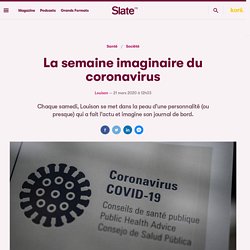
Elle misait tout sur mon frère, c'est lui qui avait tout pour réussir. Même son prénom semblait avoir été choisi pour accomplir de grandes choses: SRAS. Désolée maman, mais désormais tout le monde connaît mon nom. De la boulangère qui vous dépose un croissant sur son comptoir comme si c'était une mine antipersonnel, au président de la République, tout le monde, sans exception connaît mon nom Coronavirus pour les intimes, Covid-19 pour les autres. D'ailleurs en parlant du président, il est prévu qu'il prenne la parole ce soir à 20 heures. Mardi 17 mars.
This is what artificial intelligence will look like in 2030, according to one of the world’s leading experts. Artificial intelligence and robotics are coming into our lives more than ever before and have the potential to transform healthcare, transport, manufacturing, even our domestic chores.

Mary “Missy” Cummings, Director of the Humans and Autonomy Lab (HAL) at Duke University, and co-chair of the Global Future Council on Artificial Intelligence and Robotics, says the technology will work best in collaboration with humans. While cab drivers may fear for their jobs, she envisages a worldwide shortage of roboticists in 2030. First of all, why should the world care about AI and robotics? Artificial intelligence and robotics are showing up in every part of life, anywhere from driving, to the cellphones we use, how our data is managed in the world, how our homes are going to be built in the future.
So given its ubiquity, it really is important to start addressing the strengths and limitations of artificial intelligence. By 2030, this is what computers will be able to do. A day in the life of an Asset Manager in the summer of 2030… It’s 19th June 2030.
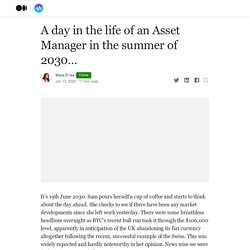
Sam pours herself a cup of coffee and starts to think about the day ahead. She checks to see if there have been any market developments since she left work yesterday. A Tale of Two Cities, 2030 Edition. Better Buildings To make our cities not only livable, but places where people thrive at work and leisure, we need to revisit what we build, how we do it, and where — recognizing a set of emergent table stakes along the way.
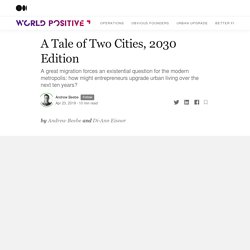
Millennials and Gen Z are driving a generational shift in living and working modalities, as both consumers and business professionals. Their desire for more fluid, flexible arrangements has led to wholesale transformation of certain sectors (e.g. Airbnb in hospitality, The Collective and Common in co-living) with others starting to emerge (e.g. Lyric is redefining business travel to meet this generational shift). The growth of distributed teams is also changing how operations work across multiple, physical “office” spaces.
This is what life will be like in 2030. You are just waking up in the spring of 2030.
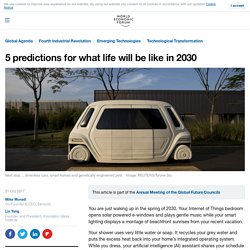
Your Internet of Things bedroom opens solar powered e-windows and plays gentle music while your smart lighting displays a montage of beachfront sunrises from your recent vacation. Your shower uses very little water or soap. It recycles your grey water and puts the excess heat back into your home’s integrated operating system. Welcome to 2030. I own nothing, have no privacy, and life has never been better. For more information watch the What If: Privacy Becomes a Luxury Good?
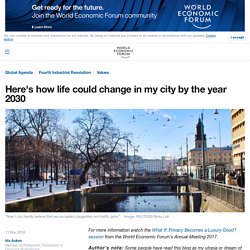
Session from the World Economic Forum's Annual Meeting 2017. Author's note: Some people have read this blog as my utopia or dream of the future. It is not. It is a scenario showing where we could be heading - for better and for worse. I wrote this piece to start a discussion about some of the pros and cons of the current technological development. Welcome to the year 2030. It might seem odd to you, but it makes perfect sense for us in this city. First communication became digitized and free to everyone. Sometimes I use my bike when I go to see some of my friends. "Environmental problems seem far away" In our city we don't pay any rent, because someone else is using our free space whenever we do not need it.
Once in awhile, I will choose to cook for myself. This also made the breakthrough of the circular economy easier. The death of shopping Shopping? "They live different kinds of lives outside of the city" Written by. My New Year’s Resolution: 2040 Edition. Imagine you had a time machine and could fast-forward to 2040.
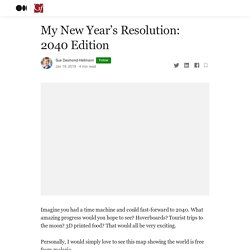
Octobre 2030: lettre à un enfant dont la mère mourut à Orthez, le jour de sa naissance, d’un «accident d’anesthésie» Temps de lecture: 5 min Une anesthésiste de nationalité belge âgée de 45 ans a, le 2 octobre, été mise en examen pour homicide involontaire aggravé.
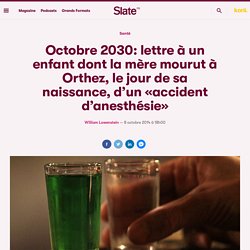
Cette décision de justice fait suite à la mort, le 30 septembre, d’une femme victime d’un accident d’anesthésie lors d’une césarienne. L’anesthésiste était ivre lors de l’intervention. Elle a reconnu souffrir de maladie alcoolique. L’enfant est vivant. Chronique du futur: une fiction climatique. Pour le 21e siècle le changement climatique sera bien plus qu’une circonstance.

Régulé ou laissé à l’emballement, il bouleversera des générations entières, offrant autant de création que de destructions, et redessinera la géographie. Dans cet article, Aude Massiot trace le parallèle entre deux trajectoires individuelles dans l’Europe de 2049. En 2018, les représentants de 197 pays étaient réunis à Katowice, en Pologne, dans le cadre de la COP24 – la 24ème Conference of Parties – pour discuter des moyens de lutter contre le changement climatique.